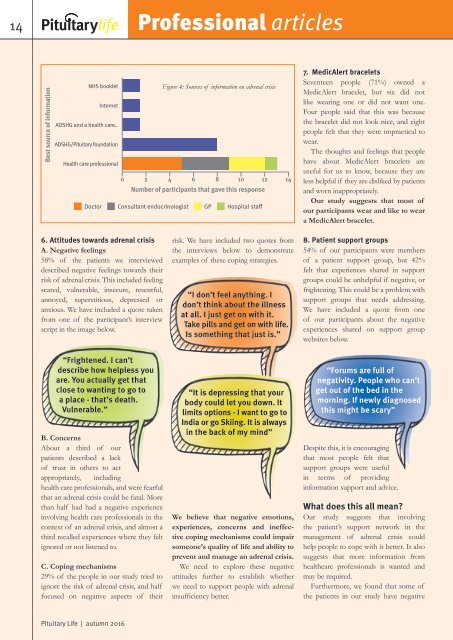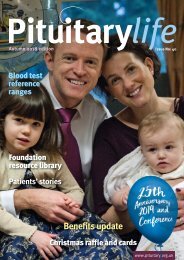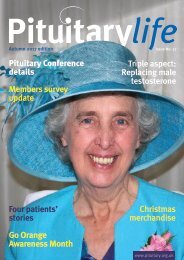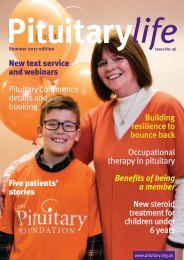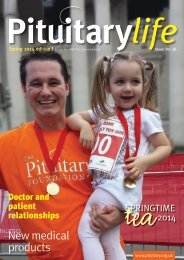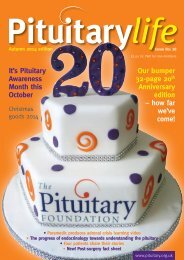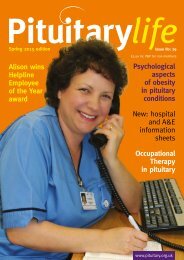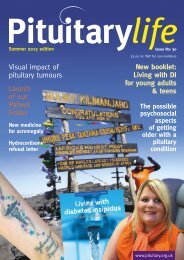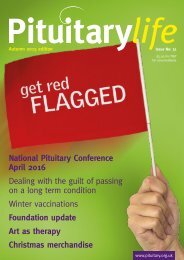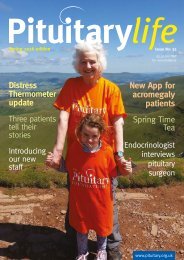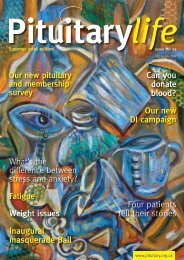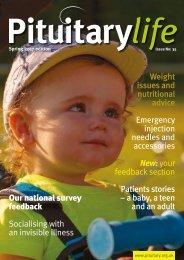Issue 34
You also want an ePaper? Increase the reach of your titles
YUMPU automatically turns print PDFs into web optimized ePapers that Google loves.
14 Professional articles<br />
Best source of information<br />
NHS booklet<br />
Figure 4: Sources of information on adrenal crisis<br />
Internet<br />
ADSHG and a health care..<br />
ADSHG/Pituitary foundation<br />
Health care professional<br />
0 2 4 6 8 10 12 14<br />
Number of participants that gave this response<br />
Doctor Consultant endocrinologist GP Hospital staff<br />
7. MedicAlert bracelets<br />
Seventeen people (71%) owned a<br />
MedicAlert bracelet, but six did not<br />
like wearing one or did not want one.<br />
Four people said that this was because<br />
the bracelet did not look nice, and eight<br />
people felt that they were impractical to<br />
wear.<br />
The thoughts and feelings that people<br />
have about MedicAlert bracelets are<br />
useful for us to know, because they are<br />
less helpful if they are disliked by patients<br />
and worn inappropriately.<br />
Our study suggests that most of<br />
our participants wear and like to wear<br />
a MedicAlert bracelet.<br />
6. Attitudes towards adrenal crisis<br />
A. Negative feelings<br />
58% of the patients we interviewed<br />
described negative feelings towards their<br />
risk of adrenal crisis. This included feeling<br />
scared, vulnerable, insecure, resentful,<br />
annoyed, superstitious, depressed or<br />
anxious. We have included a quote taken<br />
from one of the participant’s interview<br />
script in the image below.<br />
risk. We have included two quotes from<br />
the interviews below to demonstrate<br />
examples of these coping strategies.<br />
“I don’t feel anything. I<br />
don’t think about the illness<br />
at all. I just get on with it.<br />
Take pills and get on with life.<br />
Is something that just is.”<br />
8. Patient support groups<br />
54% of our participants were members<br />
of a patient support group, but 42%<br />
felt that experiences shared in support<br />
groups could be unhelpful if negative, or<br />
frightening. This could be a problem with<br />
support groups that needs addressing.<br />
We have included a quote from one<br />
of our participants about the negative<br />
experiences shared on support group<br />
websites below.<br />
“Frightened. I can’t<br />
describe how helpless you<br />
are. You actually get that<br />
close to wanting to go to<br />
a place - that’s death.<br />
Vulnerable.”<br />
B. Concerns<br />
About a third of our<br />
patients described a lack<br />
of trust in others to act<br />
appropriately, including<br />
health care professionals, and were fearful<br />
that an adrenal crisis could be fatal. More<br />
than half had had a negative experience<br />
involving health care professionals in the<br />
context of an adrenal crisis, and almost a<br />
third recalled experiences where they felt<br />
ignored or not listened to.<br />
C. Coping mechanisms<br />
29% of the people in our study tried to<br />
ignore the risk of adrenal crisis, and half<br />
focused on negative aspects of their<br />
“It is depressing that your<br />
body could let you down. It<br />
limits options - I want to go to<br />
India or go Skiing. It is always<br />
in the back of my mind”<br />
We believe that negative emotions,<br />
experiences, concerns and ineffective<br />
coping mechanisms could impair<br />
someone’s quality of life and ability to<br />
prevent and manage an adrenal crisis.<br />
We need to explore these negative<br />
attitudes further to establish whether<br />
we need to support people with adrenal<br />
insufficiency better.<br />
“Forums are full of<br />
negativity. People who can’t<br />
get out of the bed in the<br />
morning. If newly diagnosed<br />
this might be scary”<br />
Despite this, it is encouraging<br />
that most people felt that<br />
support groups were useful<br />
in terms of providing<br />
information support and advice.<br />
What does this all mean?<br />
Our study suggests that involving<br />
the patient’s support network in the<br />
management of adrenal crisis could<br />
help people to cope with it better. It also<br />
suggests that more information from<br />
healthcare professionals is wanted and<br />
may be required.<br />
Furthermore, we found that some of<br />
the patients in our study have negative<br />
Pituitary Life | autumn 2016


